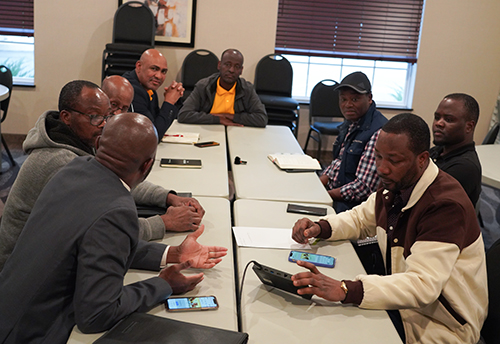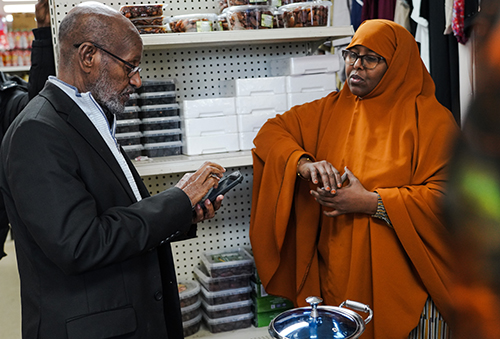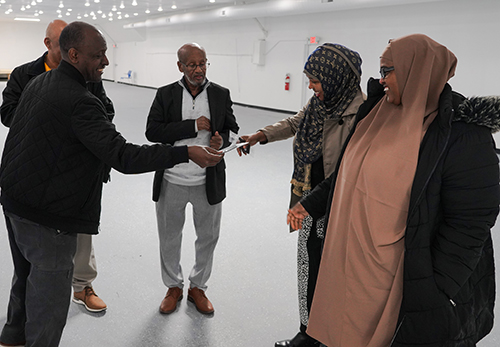 Founded in 2008, African Economic Development Solutions (AEDS) was created by immigrants who wanted to address the lack of business ownership among African immigrants in Minnesota. They saw that economic challenges and cultural differences were major obstacles to business development, and believed that building wealth was key to empowerment. AEDS helps marginalized communities by offering financial literacy training, business coaching, and homeownership education. By providing the necessary support and understanding, AEDS assists recent African immigrants and other marginalized Americans in improving their economic status and transforming their communities. The organization is committed to promoting African immigrant-owned businesses and hopes to increase economic opportunities in these diverse communities.
Founded in 2008, African Economic Development Solutions (AEDS) was created by immigrants who wanted to address the lack of business ownership among African immigrants in Minnesota. They saw that economic challenges and cultural differences were major obstacles to business development, and believed that building wealth was key to empowerment. AEDS helps marginalized communities by offering financial literacy training, business coaching, and homeownership education. By providing the necessary support and understanding, AEDS assists recent African immigrants and other marginalized Americans in improving their economic status and transforming their communities. The organization is committed to promoting African immigrant-owned businesses and hopes to increase economic opportunities in these diverse communities.
Idris Mohamed is the Director of Business Development and Housing at AEDS. He answered some questions about AEDS and how data and Minnesota Compass are integral to their work.
Q: How has the socioeconomic and demographic data provided by Minnesota Compass influenced your organization's understanding of African immigrant communities in the Twin Cities?
A: The Minnesota Compass data brought a better understanding of the African immigrant communities in the Twin Cities and some rural areas with a concentration of African immigrants. It demonstrated the need for more economic development programs for African immigrant communities.
Q: Can you share specific instances where this data has impacted your approach or programs?
A: AEDS has worked with the African immigrant community for the past 15 years in entrepreneurship and business development. The Minnesota Compass data provided more insight into the needs of the communities, particularly the 15-county metropolitan statistical data, which combines all Black residents.
Q: In your experience working in immigrant communities, do you find that the data aligns with the real-life experiences and challenges faced by individuals and families?
 A: There are real-life experiences and challenges that African immigrant individuals and families face. Among the salient issues is a need for more awareness of doing business in Minnesota, organizing business documents such as a certificate of good standing from the Minnesota Secretary of State, the SS-4 (letter from the Internal Revenue Services), and a business plan with financial projections. The challenge that the Minnesota Compass data reinforced is that the population of African immigrant communities and available funding programs are not proportional. We have a larger African immigrant population than available funds. For example, there are many large Somali communities and other Muslim cultural communities that don’t use interest-bearing loans and don’t have access to capital that fits their needs. We need funding for Islamic financing so these communities can create and expand businesses.
A: There are real-life experiences and challenges that African immigrant individuals and families face. Among the salient issues is a need for more awareness of doing business in Minnesota, organizing business documents such as a certificate of good standing from the Minnesota Secretary of State, the SS-4 (letter from the Internal Revenue Services), and a business plan with financial projections. The challenge that the Minnesota Compass data reinforced is that the population of African immigrant communities and available funding programs are not proportional. We have a larger African immigrant population than available funds. For example, there are many large Somali communities and other Muslim cultural communities that don’t use interest-bearing loans and don’t have access to capital that fits their needs. We need funding for Islamic financing so these communities can create and expand businesses.
Q: In what areas has the data highlighted essential insights or areas that may not fully capture the community?
A: The data highlighted essential insights such as the percentage of people in the community that do not speak English and those who speak it but who are not proficient. The population of African immigrants could be higher than the data show. There could be factors that might not reflect the actual number of people within each household. Because of a lack of understanding about the importance of the decennial census, the data may not share the exact number of adults who live there. It’s difficult to plan or do budgets or fund programs without accurate data from the U.S. Census Bureau.
Q: Given that the data provides detailed estimates for different African immigrant communities (e.g., Somali, Ethiopian, Kenyan, Liberian, Nigerian), how does your organization use this information to tailor and customize your programs to better meet the specific needs of each community?
 A: Language and culturally specific AEDS staff competency is congruent with many African immigrants' needs. The data increased our vision and mission to provide and deliver services to more African immigrant communities than initially thought.
A: Language and culturally specific AEDS staff competency is congruent with many African immigrants' needs. The data increased our vision and mission to provide and deliver services to more African immigrant communities than initially thought.
Q: What unique challenges or strengths has the data helped identify?
A: The data exposed the need for more program funding to increase the number of clients that we can serve.
Q: How has access to this data affected your organization's ability to make informed decisions and advocate for African immigrant communites?
A: AEDS funding proposals uses demographic data we collect to provide the appropriate services to potential clients in their language and culture. One of AEDS programs is to advocate for child care center providers and child care center start-ups. We advocate for policy change—from punitive to supportive policies. The Minnesota Compass data support AEDS efforts to contribute to this statewide (or nationwide) policy change.
Q: What specific policy or programmatic changes have been influenced by the data you've received from Minnesota Compass?
A: AEDS is developing entrepreneurship and business development training curricula that would incorporate the needs of African immigrant communities based on different cultural backgrounds. We will also increase the number of trainings per year.
Q: How does your organization engage with community leaders, policymakers, and other stakeholders using the data provided by Minnesota Compass?
A: AEDS engages community leaders, policymakers, and other stakeholders at different levels. The data from Minnesota Compass enhances our awareness, enabling us to revamp and boost intermittent engagement to better highlight the growing African immigrant (or Black) communities.
Q: In what ways does this data contribute to productive conversations and collaborations aimed at improving the overall quality of life for African immigrant communities in the Twin Cities?
A: The data significantly contributes to the overall quality of life of African immigrant communities in terms of highlighting a need for more culturally diverse programs geared toward more access to capital.
Would you like to work with Minnesota Compass to embed data profiles, tables, and interactive visualizations onto community-based organizations’ websites? Consider sponsoring an organization, or suggest a culturally specific, community-based program you would like to support having greater access to measures that matter. Contact Justin Hollis for more information.
Photos provided by African Economic Development Solutions.
